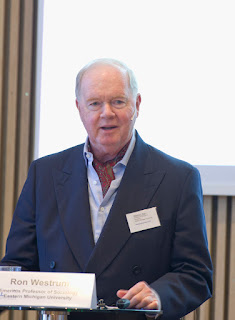Ronald Mark Westrum’s typology of organizations is an investigation of information flow in order to understand how groups thrive, survive, or fail. He finds that generative organizations get the right information to the right people in the right context. Bureaucratic organizations do this when the environment is conducive to stability, but they fail to perform under stressful new challenges. Pathological organizations have no concern for their outcomes and are defined only by how successful their leaders are at hoarding and controlling information for personal gain.
He writes: "I created a typology in 1988 to compare the way that organisations processed information. … The idea was to characterise general ways of coping with information, especially information that suggests anomaly. Failures in information flow figure prominently in many major accidents, but information flow is also a type marker for organisational culture. In some organisations, information flows well, and elicits prompt and appropriate responses. In others it is hoarded for political reasons or it languishes due to bureaucratic barriers. This typology has proven useful in a variety of safety related fields, such as aviation, nuclear power, and, increasingly, medicine.
"The underlying idea is that leaders, by their preoccupations, shape a unit’s culture. … These preferences then become the preoccupation of the organisation’s workforce, because rewards, punishments, and resources follow the leader’s preferences.
"Generative organisations get the needed information to the right person in the right form and in the right time frame. This behaviour is based on the leader’s emphasis that the most important goal is to accomplish the mission.
"By contrast, pathological circles tend to view information as a personal resource, to be used in political power struggles. It will be withheld, doled out, or used as a weapon to advance particular parties within the organisation.
"When bureaucratic organisations need to get information to the right recipient, they are likely to use the standard channels or procedures. These standard channels and procedures are often insufficient in a crisis. They failed, for instance, in communications between New York police and fire departments on 11 September 2001. The police knew that the World Trade Center north tower was about to collapse, but failed to communicate this to the firefighters inside the tower, many of whom died. By contrast, in the same circumstances many generative organisations would cross departmental lines or use a back channel to get the information to where it was needed. The Apollo 13 space crisis shows an excellent example of a generative response. By contrast, the fumbling that led to the demise of Columbia space shuttle shows bureaucracy at its worst."
“A typology of organisational cultures,” BMJ Quality and Safety, 2004;13:ii22-ii27. https://qualitysafety.bmj.com/content/13/suppl_2/ii22
Ron Westrum was my professor for five of eight sociology classes at Eastern Michigan University 2005-2010 as I completed a BS in criminology and an MA in social science. Among those courses were Complex Organizations and the Sociology of Technology. He wrote Sidewinder: Creative Missile Development at China Lake (Naval Institute Press, 1999), which was my introduction to the U.S. Naval Institute of which I have been a member since 2015.
Studying information flow in airline cockpits, Westrum applied his reseach to hospital operating rooms. From there, his theories gained even wider acceptance. You can find the full text of the paper in many places online. “A Typology of Organisational Cultures” by R. Westrum. Quality and Safety in Health Care 13 Suppl 2 (suppl_2):ii22-7 January 2005 https://www.researchgate.net/publication/8150380_A_Typology_of_Organisational_Cultures This work is widely cited. See “DevOps culture: Westrum organizational culture,” at
https://cloud.google.com/architecture/devops/devops-culture-westrum-organizational-culture He has a stub in Wikipedia: https://en.wikipedia.org/wiki/Ron_Westrum
Dr. Westrum’s typology pinpoints the failure mode for a bureaucracy. However, in our class in complex organizations, we also examined its strengths. Bureaucracy is a pre-requisite to democracy, especially for a complex society. In a functioning bureaucracy, each piece of paper moves from desk to desk on its own merits regardless of the tribe, family, caste, religion, class, race, ethnicity, sex, gender, age, or wealth of its originator. America’s failure to establish democracy in Iraq and Afghanistan is attributable to the lack of functioning indigenous bureaucracies. A functioning bureaucracy does not necessarily bring democracy. We studied the Ottoman empire as a case in point. It is necessary, but not sufficient.
Our model for rescuing a bureaucracy was Capt. D. Michael Abrashoff’s It’s Your Ship: Management Techniques from the Best Damn Ship in the Navy (Warner, 2002). Since then, I believe that Turn the Ship Around!: A True Story of Turning Followers into Leaders by Capt. David L. Marquet (Steven R. Covey, 2012) took the lesson even farther. Proof of this is the fact that Marquet’s Santa Fe and its people continued to thrive after he left, whereas the USS Benfold did not continue the journey charted by its captain.
PREVIOUSLY ON NECESSARY FACTS
Centralization and the Inverse-Square Law
A Good Place with Inadequate Philosophy
Minimizing the Likelihood of Bad Cops

No comments:
Post a Comment
Note: Only a member of this blog may post a comment.